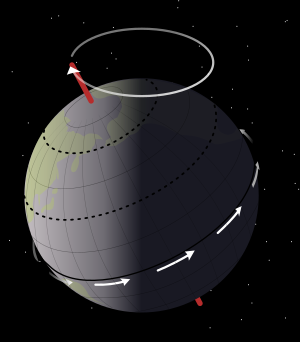 Image via Wikipedia
Image via WikipediaThe Reference Frame
Do the causes of temperature changes matter?
A key part of the climate panic methodology is to take the data and numbers out of their proper context. This procedure is being systematically applied to all quantities describing the atmosphere, all climatic phenomena, all weather events, as well as their real or hypothetical impacts.
But I will choose to discuss the most important one, the importance of particular temperature changes.
During the last 100 years, the temperature changed by something like 0.6 °C. Is that much? Well, the world hasn't noticed. Image via Wikipedia
Image via Wikipedia
But I will choose to discuss the most important one, the importance of particular temperature changes.
During the last 100 years, the temperature changed by something like 0.6 °C. Is that much? Well, the world hasn't noticed.
 Image via Wikipedia
Image via Wikipedia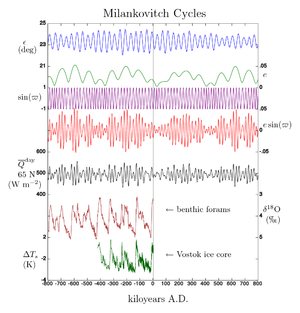 Image via Wikipedia...........Any sensible comparison shows that regardless of the cause, the temperature trend we have been observing in the instrumental era is totally negligible. Nevertheless, some people - especially the people inclined to be infected with the climate panic - often suggest that we shouldn't compare temperature changes caused by different things.
Image via Wikipedia...........Any sensible comparison shows that regardless of the cause, the temperature trend we have been observing in the instrumental era is totally negligible. Nevertheless, some people - especially the people inclined to be infected with the climate panic - often suggest that we shouldn't compare temperature changes caused by different things.I have been trying very hard to determine the reason why those people thought that one should have "separate budgets" for temperature changes caused by an underlying trend we don't quite understand - and that may be partly formed by the CO2 greenhouse effect - from the temperature changes caused by many other effects whose name is known.
Those people clearly believe something of the sort even though it must be obvious to a small schoolkid that the same temperature change has the same impact, regardless of the cause. So we simply can't blow one term out of proportion just because someone finds such a selective inflation convenient.
Well, a part of the answer is surely that many people have been brainwashed and they're literally unable to think about the concept of "temperature" rationally. However, there is another, superficially more reasonable, factor that plays a role:
Many people think that all the other processes contributing to the temperature get "undone" after some time.
Now, is it true?
Oh, really? Should we apply double standards here? Why?
Well, first of all, in a striking contradiction with their beliefs, it is more or less true for the warming induced by the carbon dioxide, whatever its magnitude is. In a few centuries after we stop burning compounds of carbon, the oceans and the biosphere will absorb the CO2 "above the equilibrium value" (that depends on the temperature) from the atmosphere. Consequently, the greenhouse effect from the extra CO2, whatever its magnitude will have been, will be reverted, too.
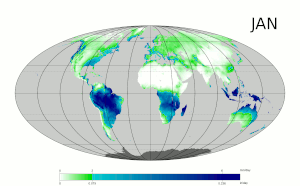 Image via WikipediaOn the other hand, many of the other drivers are aperiodic or even unpredictable - and they have no reason to "return to the average". Well, days and nights are pretty periodic, much like seasons. But even the orbital parameters are changing during the Milankovitch cycles - those that led to the ice ages.
Image via WikipediaOn the other hand, many of the other drivers are aperiodic or even unpredictable - and they have no reason to "return to the average". Well, days and nights are pretty periodic, much like seasons. But even the orbital parameters are changing during the Milankovitch cycles - those that led to the ice ages. 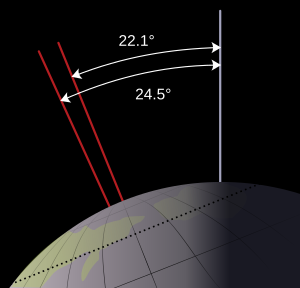 Image via WikipediaThe idea that the Milankovitch and other variations are "cyclic" is an artifact of the reasoning that led Ptolemy to the theory of epicycles. He thought that it was inevitable that the motion of celestial bodies had to take the form of a summation of some circular motions - he pretty much assumed that the Fourier transform of the trajectories had to be a combination of a few delta-functions, if I use a modern language.
Image via WikipediaThe idea that the Milankovitch and other variations are "cyclic" is an artifact of the reasoning that led Ptolemy to the theory of epicycles. He thought that it was inevitable that the motion of celestial bodies had to take the form of a summation of some circular motions - he pretty much assumed that the Fourier transform of the trajectories had to be a combination of a few delta-functions, if I use a modern language.Of course, this belief wasn't right. Although the epicycles look like a good "model" to qualitatively agree with what we see, they're simply not the right model. The right model is given by nonlinear Newton's equations of classical mechanics. And they don't imply any periodicity of coordinates in gravitationally bound systems with at least 3 bodies. Newton's theory is not about epicycles so the perturbations may lead to an arbitrarily high deviation of the Earth's axis from the present value although some very high variations are unlikely.
The climate, which is influenced by the orbital irregularities, is even more non-linear which means that there are even smaller reasons to think that the temperature changes are periodic.
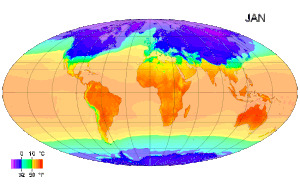 Image via WikipediaIn practice, if you observe the temperature variations during the last 600,000 years or so, you will see that the global mean temperature was kept in an interval whose length is at most 12 °C or so. Larger excursions were apparently very unlikely - even though they probably existed during most distant geological epochs.
Image via WikipediaIn practice, if you observe the temperature variations during the last 600,000 years or so, you will see that the global mean temperature was kept in an interval whose length is at most 12 °C or so. Larger excursions were apparently very unlikely - even though they probably existed during most distant geological epochs.However, if you try to increase the accuracy and substantially reduce the figure 12 °C, you will simply get a wrong model. Even if you use the word "noise" for all the complicated wiggles in the temperature graphs, you won't become able to actually predict the temperature for centuries in advance with a better accuracy than 1 °C.
In fact, the real-world models can't even predict the right temperature changes for a decade with an error margin that is substantially smaller than 100 percent of the predicted temperature change. Whenever people tried to use fancy methods to get a more accurate prediction, they actually obtained much worse predictions.
This leads me to a related point of the people who like to "discriminate" different sources of temperature change: they just believe that the "signal and noise" can be sharply separated and they must be treated separately.
However, there exists absolutely no scientific separation of the temperature as a function of time to "signal" and "noise". Just try to design an operational method how to separate them and you will see that it will inevitably depend on your completely arbitrary conventions how a function should be divided into two.
The only real temperature we're observing is the actual temperature. Trying to pretend that "a part of the temperature" is not real or interesting is just a denial of the data. If the ENSO cycles change the global mean temperatures by half a degree, these are real changes.
The only real temperature we're observing is the actual temperature. Trying to pretend that "a part of the temperature" is not real or interesting is just a denial of the data. If the ENSO cycles change the global mean temperatures by half a degree, these are real changes.
Saying that the temperature is bound to go up by the year XXXX is just a speculation.
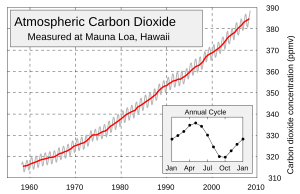 Image via WikipediaSo in January 2011, the ecosystems and everyone else are simply experiencing temperatures that are below the average January temperatures from the 1980-2010 period. You can't do anything about it. It also means that if the cold global temperatures may be identified as a culprit of some problems in the U.S., U.K., or elsewhere, it is also inevitable to say that a small part of these problems was caused by the people responsible for attempting to cool the planet - although they have only cooled it by 0.0001 °C or so, for a few trillion of dollars so far.
Image via WikipediaSo in January 2011, the ecosystems and everyone else are simply experiencing temperatures that are below the average January temperatures from the 1980-2010 period. You can't do anything about it. It also means that if the cold global temperatures may be identified as a culprit of some problems in the U.S., U.K., or elsewhere, it is also inevitable to say that a small part of these problems was caused by the people responsible for attempting to cool the planet - although they have only cooled it by 0.0001 °C or so, for a few trillion of dollars so far.There is absolutely no way to honestly introduce double standards here. If one decides to claim that the temperature deviated from the average of some random era are a bad thing, it must inevitably be true that whoever helped to increase this deviation has done a bad thing. You can't use two different temperatures - the real temperature measured by thermometers and an "adjusted one" from which some "speculative noise" was subtracted - and you can't choose the "more convenient one" depending on what you find more convenient for your claims.
Such an attitude is a flagrant case of dishonesty. However, this is exactly what alarmists - including softcore alarmists - are doing pretty much all the time. The only possible conclusion is that they don't want the policies to depend on the actual temperatures measured by thermometers - or any honest data, for that matter: they want the policies to depend on whatever fabricated data that are good enough to justify the pre-decided policies.
That's why this stuff has nothing to do with the scientific method and is just a dirty form of politics.
Discovery
HAND PREFERENCE IN HUMANS, ANIMALS EXPLAINED
Whether you more frequently use your right hand or your left isn't so much a choice as it is hardwired in your brain.
- Hand and limb preference in humans and other animals is tied to eye preference.
- Eye preference, in turn, is linked to which side of the individual's brain is more dominant.
- Cerebral lateralization, or how information processing is divided and coordinated between the brain's hemispheres, controls limb preferences.
Iraqi Leader Accused Of Running Secret Prison -NPR
A leading human rights group has released findings accusing Iraqi Prime Minister Nouri al-Maliki of running his own personal combat brigade. The group says this brigade is overseeing a secret detention facility where men accused of terrorism and other crimes are tortured and kept incommunicado, with no access to lawyers or relatives.All this despite the fact that Maliki had promised to end such practices after similar findings last year( Sounds like Dick Cheney )









No comments:
Post a Comment